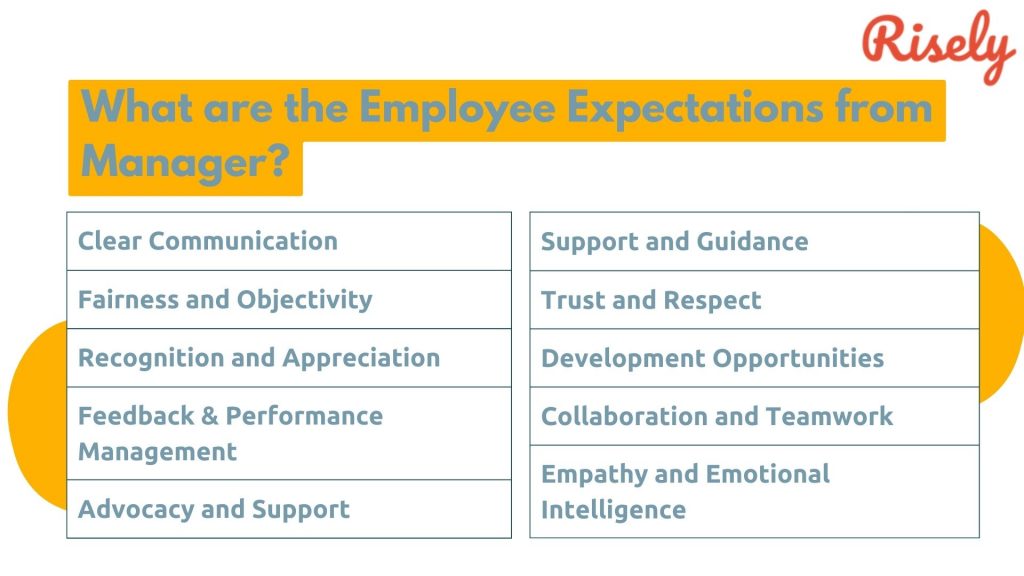Top 10 Tips to Fulfill New Manager Expectations
Congrats on landing that promotion! You must be buzzing with excitement (and maybe a touch of overwhelm). Let’s face it, managing people is a whole new ball game. But hey, you wouldn’t be here if you weren’t up for the challenge, right? Here’s the thing: while you’re busy figuring out how to be a great boss, your team has its own set of expectations. It’s a two-way street, after all. So, the question is, what exactly are those expectations, and how can you meet (and even exceed) them? Buckle up, because we’re about to dive deep into the wonderful world of employee expectations and set you on the path to management mastery.What are the Employee Expectations from Manager?
Congrats on the promotion! Now that the confetti’s settled, you probably wonder, “What exactly do my team members expect from me?” It’s a fair question. After all, you want to build strong relationships, keep your team engaged, and crush those goals together. Well, buckle up because we’re about to decode the top 10 employee expectations for their new manager. Think of it as your cheat sheet for management mastery!- Speak Up, Clearly and Often: Imagine this: you’re working on a project but unsure if you’re on the right track. Sound familiar? Employees crave clear communication from their managers. This means keeping them in the loop about project goals, deadlines, and expectations. Think of yourself as their mission control, guiding them towards a successful launch.
- Be Their Guide on the Side, Not Just the Boss on Top: Remember when you aced that presentation after your manager gave you some killer pointers? Yeah, that’s the power of good support. Your team needs you to guide them, offering direction and assistance when they hit roadblocks.
- Fairness is the Name of the Game: Nobody likes a micromanager or, worse, a manager who plays favorites. Strive to be a fair and objective leader. This means treating everyone with respect, evaluating performance based on merit, and offering equal growth opportunities.
- Trust Goes a Long Way (and Respect Follows Close Behind): Building trust with your team is crucial. This means actively listening to their concerns, valuing their ideas, and creating a space where they feel comfortable speaking up. Respect their expertise, and you’ll earn theirs in return.
- Don’t Forget the Power of “Thank You”: A simple “thanks for your hard work” can go a long way. Employees want to feel appreciated for their contributions. Make recognition a habit, whether a public shout-out or a private word of praise.
- Help Them Level Up (Seriously, It Benefits Everyone!): Your team wants to grow, and you hold the key. Provide opportunities for learning and development. Offer mentorship, encourage skill-building workshops, and invest in their professional growth. Remember, a stronger team is a winning team.
- Feedback Isn’t a Four-Letter Word (Promise!): Regular feedback is essential for employee growth. Don’t wait for annual reviews! Offer constructive criticism that’s specific and actionable. Help them identify areas for improvement and celebrate their strengths.
- Teamwork Makes the Dream Work (and You’re the Dream Weaver!): Foster a collaborative environment where everyone feels valued. Encourage open communication, break down silos, and create opportunities for teamwork. When your team works together, magic happens!
- Be Their Champion: Your team faces challenges, and you’re there to support them. Advocate for their needs, address their concerns, and help them navigate obstacles. Be their champion within the organization, and they’ll have your back.
- Put Yourself in Their Shoes (Empathy is Key!): Great managers understand what their team is going through. Practice empathy by actively listening to their challenges, acknowledging their frustrations, and creating a supportive work environment. When you show you care, your team will thrive.

What Expectations to set as a New Manager?
As a new manager, expectation setting for your team member is the first step toward being a better leader. It’s essential to be clear, concise, and consistent when communicating expectations, whether with individuals or the whole team. Here are some tips for what expectations to set as a new manager: – Communicating Expectations with Individuals:- Be specific: Clearly articulate the desired outcome and provide details about what needs to be accomplished. Avoid vague or ambiguous language that can lead to misunderstandings.
- Use SMART goals: Set goals that are Specific, Measurable, Achievable, Relevant, and Time-bound. This helps individuals understand their expectations and provides a clear framework for success.
- Provide context: Explain the rationale behind the expectations. Help individuals understand how their tasks contribute to the broader goals and objectives of the team or organization. Contextual understanding fosters a sense of purpose and motivation.
- Encourage questions and clarification: Create an open and safe environment where individuals feel comfortable asking questions to clarify any uncertainties. Encourage two-way communication to ensure a clear understanding of expectations.
- Regularly review and revisit expectations: Check in with individuals periodically to review progress and address any challenges. Provide feedback and guidance to help them stay on track and make necessary adjustments.
Other Interesting Reads
- Hold team meetings: Conduct regular team meetings to communicate expectations collectively. Clearly outline goals, priorities, and any changes in expectations. Encourage open discussion and address any concerns or questions raised by team members.
- Provide written documentation: Supplement verbal communication with written documentation, such as emails, memos, or shared documents. This ensures that expectations are documented and can be referenced later if needed.
- Use visual aids: Visual aids, such as charts, diagrams, or presentations, can help convey complex expectations more effectively. Visual representations can enhance understanding and retention of information.
- Foster a culture of transparency: Create an environment where open communication is encouraged. Be transparent about expectations, progress, and any changes that may arise. Transparency builds trust and helps team members align their efforts.
- Encourage collaboration and accountability: Foster a team culture of collaboration and accountability. Encourage team members to support each other in meeting expectations and holding one another accountable. This cultivates a sense of collective responsibility for achieving shared goals.
- Follow up and provide feedback: Regularly follow up with the team to review progress and provide feedback on performance. Recognize and celebrate achievements, and promptly address any issues or gaps in meeting expectations.
Tips for Fulfilling the New Manager Expectations
Here are the ten tips for fulfilling new manager expectations. By implementing these tips, you can effectively meet the employee expectations from manager and create a positive and productive work environment.- Be a Listening Ear, Not Just a Talking Head: Let’s be honest, nobody likes feeling unheard. Actively listen to your team members’ concerns, ideas, and roadblocks. When you give them your full attention, you build trust and gain valuable insights to guide your team forward.
- Communication is a Two-Way Street: Imagine a project going sideways because information got lost in translation. Nightmarish, right? Keep your team in the loop by fostering open communication. Share updates, address concerns promptly, and encourage open dialogue. Transparency builds trust and keeps everyone on the same page.
- Crystal Clear Expectations Pave the Way for Success: Nobody thrives in a world of ambiguity. Set clear expectations for your team, including project goals, performance metrics, and even communication preferences. This clarity empowers your team, eliminates guesswork, and sets everyone up for success.
- Lead by Example, Inspire from the Front: Actions speak louder than words. Be the role model you want your team to follow. Demonstrate a strong work ethic, positive attitude, and commitment to the company values. When you lead by example, you inspire your team to reach their full potential.
- Growth Isn’t a Solo Act, It’s a Team Adventure: Your team wants to learn and grow. Don’t be a knowledge hoarder! Provide opportunities for professional development, like mentorship programs or skill-building workshops. Investing in your team’s growth strengthens your team’s foundation and yours by extension.
- Delegation Done Right: Trust, Empower, and Conquer: Micromanaging stifles creativity and drains morale. Delegate tasks strategically, empowering your team members to take ownership. This fosters trust, helps them develop new skills, and frees you up to focus on the bigger picture.
- Recognition: The Sweetest Reward: A simple “thank you” can do wonders. Regularly acknowledge and appreciate your team’s efforts, both big wins and everyday contributions. Recognition shows you value their hard work, boosting morale and motivation.
- Teamwork Makes the Dream Work: Silos are the enemy of innovation! Encourage collaboration by breaking down barriers and fostering open communication. When your team works together, they can share ideas, solve problems creatively, and achieve amazing things.
- Tough Love? Not Exactly. How About Constructive Feedback?: Feedback isn’t a four-letter word, it’s a growth tool. Offer specific and actionable feedback to help your team improve. Focus on areas for development while celebrating their strengths. Remember, constructive criticism helps your team reach their full potential.
- Be Their Champion, Fight for Their Wins: Your team faces challenges, and you’re their advocate. Support their needs, address their concerns, and champion their successes within the organization. When you fight for your team, you build loyalty and create a win-win situation for everyone.
Conclusion
While the new role is exciting, leading a team can feel overwhelming. The good news is, you don’t have to go it alone. This blog unpacked the top new manager expectations and how to meet them. Here’s the gist: clear communication, effective delegation, and well-defined expectations are your golden keys. Balance that with being a supportive leader who sets high standards, and you’ve got the recipe for team success. Use this guide as your roadmap to navigate those expectations and become the leader your team deserves. Remember, a motivated and empowered team is the key to achieving big things!Unlock your leadership potential and become an efficient manager with our Manager Effectiveness Masterclass
The Manager Effectiveness Masterclass helps you find the support you need to make your dreams come true.
Frequently Asked Questions
What is expected from a new manager?
As a new manager, it is expected that you establish clear goals and objectives for yourself and team members, communicate expectations transparently, delegate effectively, provide constructive feedback on performance, offer support when needed, and ensure that individual employees have a clear understanding of their roles through job descriptions and check-ins. Striking a balance between setting high standards while being approachable and supportive is also crucial to success.
What are the top 3 qualities you expect from a new manager?
We would like to suggest three essential qualities for a new manager to possess. Firstly, great communication skills are crucial; they should be transparent and able to articulate expectations clearly. Secondly, effective delegation skills; new managers should be able to delegate tasks effectively among team members while ensuring accountability. Lastly, good leadership skills; they should strive to motivate and inspire their team members towards achieving common goals. These three qualities can set the foundation for a successful career as a new manager.
How do you set expectations as a new manager?
As a new manager, setting clear expectations from the start is essential. Begin by defining your goals and objectives for yourself and your team, and communicate them transparently to your employees. Regular check-ins ensure everyone is on the same page and adjust expectations. Be open to feedback and willing to make adjustments where needed. Setting realistic expectations and holding yourself accountable will lead to a successful management career.
Other Related Blogs
Read this if you think you can run The Bear
Read this if you think you can run The Bear What if your favorite mom-and-pop deli is transformed into something high-end super quick? We are talking of The Bear, Carmy,…
New Managers and Small Teams: A Match Made Not Made In Heaven
New Managers and Small Teams: A Match Made Not Made In Heaven My team currently has nine people, including myself. That sounds pretty simple, right? After all, exactly how much…
Top 10 New Manager Skills That You Must Learn
Top 10 New Manager Skills That You Must Learn Congratulations on your promotion as a new manager! It’s a big transition and can be challenging. You may have been an…
5 Ways of Coaching for New Managers in the Age of AI
5 Ways of Coaching for New Managers in the Age of AI In today’s rapidly evolving business landscape, new managers face unique challenges. Not only do they have to adapt…


